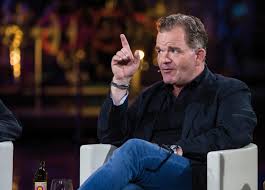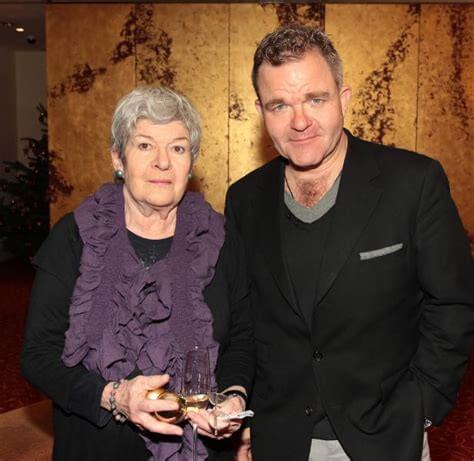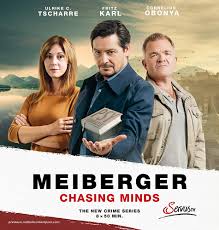Interviews
Kurier März 2020 with Isabella Leitenmüller-Wallnöfer

How are you in the face of Corona?
Probably like all of us. I keep the barracking with my family quite conscientiously. We also have to take care of my mother, who belongs to the highest risk group. But in the end we have enough to do. We have to do so much work at home - for the time afterwards.
Your son is 14. How does he get on?
It's great to see how quickly teenagers can learn to organize themselves. Everything goes into the brain slowly, as with all adolescents - but he understood the situation. I think that the school year should end, if necessary from home. Otherwise the children's perspective is taken away. Perhaps one could try to provide parents and students with the necessary equipment. It is important that children are not disadvantaged in education because they do not have access to a computer.
The pandemic reminds many of disaster films. Us you?
We are no longer used to real catastrophes, especially in Austria. I turned 51 on Sunday - and luckily I haven't seen a war. Not even the student revolution anymore. The end of the Cold War was perhaps still an event. But we did not know about general physical hardship or the situation that almost everyone suddenly no longer had any income. In addition: it happened so quickly. That reminds me of "The Outbreak", which is exactly where: a virus that nobody knows. Science has been saying for years that something like this will come again and again. Incidentally, what we now experience in terms of commitment and solidarity would be the emphasis that we would also need when it comes to saving the planet.
Will culture become a streaming experience or will we sit in the theater again?
I very much hope that we will have a shared cultural experience again. For us artists too. I like to make films, but live in front of an audience, that cannot be replaced. The good old storytelling. Streaming services in culture have long been a reality. And it's a wonderful chance to see an opera performance from Covent Garden in the cinema if you can't go to London.
How is your working life affected?
It's all on hold. The planning for the next filming would now have started - a third season "Meiberger" and an Altaussee thriller for Servus TV. Now everything is open. This affects me like everyone else: no income and projects. I can not say when and whether they go on.
Are you worried?
You can keep this up for a while. This is where the part begins, which is very difficult for the artists. There are many, from all genres, who have no income. There were a lot of unemployed actors anyway or those with jobs that weren't very well endowed. Something like now is like a general blackout. Then nothing works anymore. Therefore, I am in favor of serious discussions about safeguards - not just for artists.
The ORF shows the TV thriller "In the Dark Valley". The film was shot in Bad Gastein.
What was striking for me was that Bad Gastein has a lot of decay: lunch under an absurd 70s prefabricated concrete facade, where the iron comes out. But it is also beautiful. I had never dealt with Bad Gastein before, although my maternal grandparents owned a pastry shop there in the 1950s - until the manager disappeared with the earnings. I tried to find out where the pastry shop was - but I didn't find it.
You play a cop who investigates but wants to protect people he loves.
Franz Robanegg is a policeman who definitely cannot just regulate traffic. But the basic overwhelming requirement that he actually thinks correctly and then does the wrong thing - I like that kind of thing about figures when they trigger an absurd chain reaction.
It is stuck in the valley, where everyone knows everyone - that is a blessing, but also a curse.
Absolutely. You are secluded, you have your own world. Robanegg knows what it means when the residents of Bad Gastein learn something. Things don't fall silent, they stick to you. The bigger the world, the sooner you can come up with different solutions. That is why I am a friend of the great global network, a friend of Europe: that we know each other, take on influences, become more open. And I think it's absurd that a country like Austria can't manage to take in a thousand children from a refugee camp. They have just survived the winter, now Corona threatens. I´m just asking: How on earth can an unguided child probably survive this?
Your recommendation for Corona barrackers?
Philipp Blom's "The tumbling continent" is always good over the years 1900 to 1914. It is less about how you stumbled politically into the First World War, but more about a society that had just discovered the pace and the change in it general perception. Or his book "The Italian Journey", in which Blom follows the story of his violin. To practice, I read Daniel Silva's Gabriel Allon series, thrillers in the sense of Jason Bourne, written in a rapid style. . . I am one of the terribly old-fashioned people, I need the feel of the book
Interview Wiener Zeitung June 15th 2019 with Christine Dobretsberger
Carolin Pienkos and Cornelius Obonya:
"We want to allow emotions and pathos"
"Soul Mates", Part 6: The director and the actor about their special work and private relationship - and the relevance of the "Magic Flute", which they direct together.
"Wiener Zeitung": In tennis there is this unwritten law, according to which couples should not play doubles with each other, because otherwise the house blessing could go wrong. They have been married for 17 years and have recently been directing together. Do you see this collaboration as an enrichment or rather a test of the strain on your relationship?
Carolin Pienkos: As an absolute asset! We can always work on what is on our minds. We are always interlocutors.
Cornelius Obonya: We talk to each other constantly, it was like that from the beginning. Before we got together, our big basis was the conversation. Then it quickly became clear that we fell in love with each other. Before we started working together, that's over 17 years ago, we said that if we start arguing, we won't work together because the private sphere is more important.
Pienkos: And it's getting more and more intense!
Ms. Pienkos, you have already staged many plays where Mr. Obonya acted as an actor. When it comes to directing together, however, the starting point is different, especially since this is clearly your profession. How can you imagine the division of tasks?
Pienkos: In preparation for a production, you have to go through the whole piece mentally. This also includes examining the dramaturgical development of the individual characters. Is a figure worked consistently? Is it logical that it develops in one way or another? Discussing all this with someone who argues from the perspective of the actor is enriching for a director because it helps to find the character's inner perspective.
Obonya: We actresses build our roles from the inside out - like a layered cheese. Directors usually already have the complete layered cheese in front of them, they already know where the whole thing should lead. For the actor, however, there are often completely different corners and ways to get to this point. We try to make these individual layers tangible for us during rehearsals. And then, as an actor, I begin to understand what the director at best meant from the start. The task is to find a timing here. I am very grateful that my wife allows us to direct together.
The first joint directorial work was the staging of the "bat" at the Milan Scala 2018. How did this offer come about?
Pienkos: Alexander Pereira had the plan to put a "bat" on the game board for the first time at the Scala - and of course it made sense to make an Austrian "bat". At the time, Cornelius was playing "Jedermann" in Salzburg - and so suddenly this completely surprising request came up.
Obonya: It was a jump into the cold water for both of us. For Carolin in that it was musical theater for the first time, and for me in two ways. Then we said: Okay, you can't do more than fail!
Pienkos: And then everything came naturally and we enjoyed this adventure together with great joy.
Obonya: Incidentally, this runs through my entire career. Everything I did for the first time, I always had to learn in an absurdly fast run. Ultimately, learning by doing is the only thing that will advance you in this profession if you want to try different things.
Now you are jointly responsible for directing the "Magic Flute", which will premiere on July 10th in the Römersteinbruch St. Margarethen. What can you expect?
Pienkos: We want to tell a fairy tale that is still relevant today and above all shows a social vision that is in this opera. The ideals of equality and reason, especially between men and women, are discussed.
And another essential narrative thread is the heroic story of Tamino, who overcomes his fears and manages to prove his unconditional love. Just like Pamina. That makes them equal. But for that they have to risk their lives. That is great passion and great despair. We want to allow emotions and pathos, which is all too often confused and ridiculed with sentimentality today.
Obonya: You have to act very differently in this context than in an opera house: You have to find clear, big gestures.
Pienkos: 60 meters of stage width is a dimension where you simply have to focus the viewer's gaze. We also want to make the dialogues clearer. Even if the Magic Flute - especially in Austria - is a sacred cultural asset, you should
Interview with Elisabeth Orth, his Mother and fellow actress and Cornelius Obonya Kleine Zeitung 2018 with Julia Schafferhofer

Mr. Obonya, what are your most formative memories of your childhood?
CORNELIUS OBONYA: A huge memory is: When my mother and father went out, the whole house was filled with their scents and bathed in yellowish light. These were lampshades that my mother inherited from her parents, which I then had in my first two apartments - until they crumbled. They came from the 1930s. These were animal skins stretched over a light bulb, which were in large, bulbous bottles full of gravel or sand. My childhood lamps. The memory is garnished with the curses of my father, who did not get the tie, which I took over from him vertically.
Does this coincide with your memories, Ms. Orth?
ELISABETH ORTH: His room was on the first floor. I can remember that he loved to go out of the family. There he heard stories or told stories himself: a wild west story. With horse tramp. I gave them to my parents, stupid as I was. I had to fight for a year to get this cassette back because they didn't want to give it out anymore. OBONYA: And my son is now retiring to the same, renovated, first floor. He is twelve and comes into an intermediate phase: he plays Lego and listens to Eminem. Which I really appreciate both.
ORTH: The word for all adolescents: closed due to renovation. This is from Molden.
Have you discovered his acting talent in the Wild West stories? ORTH: No, interestingly, not at all. I found it normal that my son is so talented. I thought it was going to be something. But for God's sake not an actor again! This eternal longing of the whole family is finally a mathematician - but nobody comes.
With the term mother pride: what do you associate with it?
ORTH: I avoid the word pride. I find it very horrible. I still remember after the "Jedermann" premiere in Salzburg, a crowd of press people came and they said: 'Well, san you ned proud of your son?' And I said: 'Unfortunately I can't start with pride. I'm glad. And out of joy. ’Then they looked a little stupid. The premiere was really nice: standing ovations on the cathedral square are not common.
Then I rephrase the question: When does it almost tear your heart as a joy?
ORTH: When I play with him.
OBONYA: Detto.
ORTH: With Coriolan (note: Orth and Obonya can be seen in the Shakespeare play at the Akademietheater): If, for example, the scene between us where we attack - that's why we played it - the spark jumps and it mostly jumps, then he’s also down there, with the audience. I have a real feeling of happiness and think to myself: It's a shame that the evening is already over. It is a pure feeling: professionally and privately.
Are there any new ideas for working together?
ORTH: Unfortunately not.
OBONYA: Something like that has to grow. We never looked for it explicitly. It also becomes unhealthy in external perception if you work together too often, especially in this family. I respect that. It's like when the nobility marries 800 times in a row ...
ORTH: Inbreeding is the word.
OBONYA: Exactly, and that happens in this area too.
Have you always had a good relationship?
ORTH: In puberty I could have killed him, in between.
OBONYA: Me too.
ORTH: But we knew that somewhere subliminally. Then there is the nice deal. Already with the noise. If you throw something at me, please keep it. Even if I throw something at you, I pick it up. Not you. I. We held out. It works wonderfully. It's just not a mess.
Did you actually celebrate Mother's Day?
ORTH: I've been waiting for this question. No. Three callsigns.
And I expected such an answer.
ORTH: Wonderful.
OBONYA: No, wait! I've already given you presents at school.
ORTH: She didn't mean that. Roosevelt ... What was her first name?
OBONYA: Eleanor.
ORTH: Thank you. Eleanor pushed that up in the US, Mothers Day. I read that somewhere and thought: Another business-oriented ceremony. No! We will not support that. We are definitely far to the left of Eleanor and we will not follow these business practices with a bouquet and pink thingies. The biggest horror: breakfast in bed. Because I hated these crumbs, which of course fall off. I wholeheartedly rejected that and he took part.
What else did your son teach you about life?
ORTH: A strange kind of life patience, if I may put it that way, and thinking before breaking out. I was happy to see that because it was also a 16-corner greeting from his father to me.
And what h
Short interview about TV Series Meiberger Season 1

Fritz Karl, Cornelius Obonya, Ulrike C. Tscharre
CO: "I used to sleepwalk after my father's death. Then I was nine and I should have walked through the house several times during the night and I can only remember one single moment during the summer vacation when my mother cautiously pointed it out to me in the bathroom and asked what I was doing there. I was getting ready for school. "
CO: “As far as my figure is concerned - I would certainly not get along with it because to a certain extent it is simply a bore. That was also the nice thing about the role, to play it that way, because otherwise I like to access roles that have something special, of course, and here the opposite really appealed to me. It was crucial for me to show someone who is completely normal. He can do his job, but he also likes the end of the day. He is more or less a person who says, okay, what I see is there and what I cannot see is not there. This is of course different from me, because I have to constantly deal with things that are not there. I was interested in this normality. But I think if I had to talk to that at some point, I wouldn't know what to say. "
Social Media Links
Facebook | Instagram | Twitter | Linkedin | Operabase